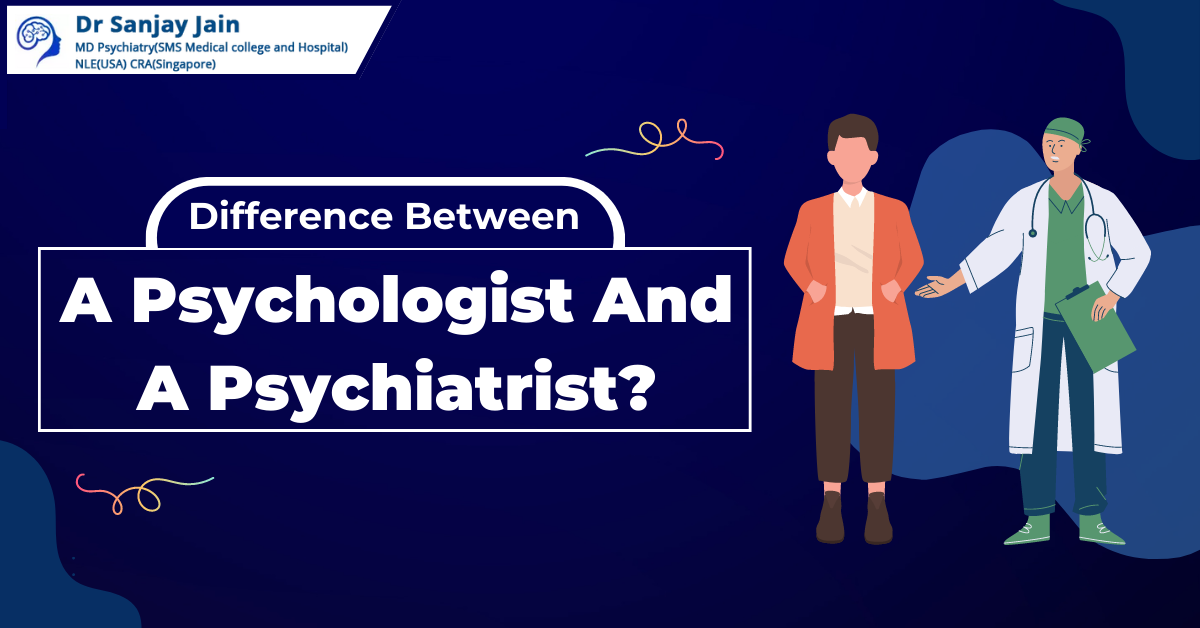
Difference Between A Psychologist And A Psychiatrist?
If you’re aiming for a mental health career, you’ve come across the terms psychologist and psychiatrist. However, don’t let the similarities confuse you: these professions have distinct differences to pay attention to. They vary in everything from their training to their methods. Therefore, before proceeding, let’s learn the differences between these two professionals in the mental health field.
Becoming a qualified psychiatrist requires extensive training in general medicine and psychiatry. This enables them to expertly diagnose and treat mental health disorders by prescribing medication for anxiety, depression, bipolar disorder, etc. To provide top-quality patient care, psychiatrists carefully examine physical, genetic, and environmental factors contributing to mental health conditions and collaborate closely with other medical professionals.
While psychologists are mental health professionals who hold doctoral degrees in psychology. Unlike psychiatrists, psychologists do not prescribe medication but specialize in talk therapy and other non-pharmacological treatments. Implementing evidence-based therapies, including cognitive-behavioural therapy (CBT), psychodynamic therapy, and humanistic therapy, psychologists assist patients in managing their symptoms and improving overall mental health.
Psychologists and Psychiatrists: Overall Comparison
Dr. Sanjay Jain is a trusted mental health professional, but as you begin your treatment, you’re on the right path, you may be wondering about the roles of psychologists and psychiatrists.
Now, after knowing the basic things, you must have got an idea of the difference. In this blog, we will learn about the overlapping areas between these two professions. For example, some psychiatrists may also offer psychotherapy services, and some psychologists may work in research or academic settings. It’s time to determine which profession aligns with your interests and goals.
Who Is A Psychiatrist?
A psychiatrist is an expertly-trained doctor who specialises in treating mental health conditions. They have the skills to diagnose, treat, and prevent various mental illnesses and emotional disorders. With extensive knowledge, they can consider multiple biological, psychological, and social factors when making diagnoses. Also, they handle mental health conditions and underlying physical health issues with the same approach.
One of the most exceptional abilities of a psychiatrist is to prescribe medication to help patients manage their symptoms. For instance, if someone is feeling hopeless and down, antidepressants can improve their state of mind. On top of this, psychologists can also offer counselling and therapy to help patients overcome any emotional obstacles in their daily lives. Psychiatrists play an important role in treating mental health
conditions. You will also have to work with other healthcare professionals to deliver comprehensive care to their patients.
Becoming a psychiatrist is no easy task. It demands rigorous education and specialised training. You must first complete a four-year undergraduate degree, followed by medical school. From there, you’ll need to pursue extensive psychiatry training for years. As a psychiatrist, you’ll have the power to help patients overcome their symptoms and achieve a newfound sense of well-being. If you share a passion for mental health and find fulfillment in helping others, then a career in psychiatry should be at the top of your list of potential career choices.
What Treatments Can A Psychiatrist Provide?
Psychiatrists are essential in enabling individuals with mental health conditions to attain optimal mental well-being and overall quality of life. As specialised medical professionals in this field, they possess the expertise required to offer a variety of treatments that can effectively manage symptoms. Here are some of the treatments that a psychiatrist can provide:
- Medication Management
- Psychotherapy
- Electroconvulsive Therapy (Ect)
- Collaborative Care
- Transcranial Magnetic Stimulation (TMS)
1. Medication Management
Psychiatrists can prescribe medications to alleviate the symptoms of various mental health conditions, including depression, anxiety disorders, bipolar disorder, schizophrenia, and attention-deficit/hyperactivity disorder (ADHD). With expertise in medication management, psychiatrists closely monitor patients’ medication responses, adjusting dosages when necessary to ensure safety and effectiveness. This allows patients to receive personalised treatment tailored to their unique needs and circumstances.
2. Psychotherapy
Psychiatrists are highly skilled in providing talk therapy, or psychotherapy, to effectively assist their patients in handling emotional challenges. By utilising various techniques such as cognitive-behavioural therapy (CBT), dialectical behaviour therapy (DBT), and psychodynamic therapy, these experts aid patients in devising coping mechanisms, bettering their symptoms, and easing their general quality of life.
3. Electroconvulsive Therapy (Ect)
This treatment passes electrical currents through the brain to quickly induce a seizure. It is an impactful treatment to manage severe depression, bipolar disorder, and other mental health conditions.
4. Collaborative Care
Psychiatrists team up with other healthcare professionals, such as therapists, social workers, and primary care physicians, to provide inclusive care to patients. This process includes consultations, medication management, and other services to aid in achieving individual treatment goals.
5. Transcranial Magnetic Stimulation (TMS)
A non-invasive treatment that utilises magnetic fields to stimulate nerve cells in the brain. It is highly beneficial for treating depression and other mental health disorders.
Who Is A Psychologist?
A psychologist is an expert who specialises in investigating the intricacies of the human mind and behaviour. By leveraging many scientific methods, including thorough research and experimentation, psychologists gain deeper insights into the reasoning behind people’s actions and thought processes. Additionally, they work alongside individuals to assist them in tackling mental and emotional challenges while providing methods to enhance their overall wellness.
Psychologists can operate in hospitals, mental health clinics, universities, and private practices. They frequently focus on developmental psychology, counselling psychology, or clinical psychology. Many psychologists also engage in extensive research initiatives or are passionate about teaching – often within academic or research institutions.
Besides, they help people better understand their thoughts, emotions, and actions. They develop strategies to help people cope with challenges and improve their lives. To achieve this, you have to learn therapeutic techniques such as cognitive-behavioural therapy (CBT), psychoanalytic therapy, and humanistic therapy to tailor your approach and meet the needs of each client.
Furthermore, researching the complexities of human behaviour help develop more effective treatments for mental health disorders and studies important topics such as addiction, depression, anxiety, and trauma.
What Treatments Can A Psychologist Provide?
As experts in mental health, psychologists offer a vast array of treatments to aid individuals in conquering emotional and psychological challenges. Here are some of the treatments that a psychologist can provide:
- Psychotherapy
- Mindfulness Techniques
- Behavioural Change
- Group Therapies
- Cognitive Testing
1. Psychotherapy
This is the gold standard of treatments that psychologists offer. It encompasses conversing with a therapist to tackle emotional or behavioural problems and to develop strategies for coping with hard situations. Psychotherapy can take many forms, including cognitive-behavioural therapy (CBT), interpersonal therapy (IPT), and psychodynamic therapy.
2. Mindfulness Techniques
In addition to psychotherapy, psychologists may teach mindfulness techniques to help individuals manage stress, anxiety, and depression. These techniques can include meditation, deep breathing, and other relaxation techniques.
3. Behavioural Change
Psychologists have the expertise to aid individuals in transforming their negative behaviours that could adversely affect their mental health. Exposure therapy and systematic desensitisation are effective techniques for overcoming phobias and confronting fears.
4. Group Therapies
Psychologists conduct group therapy sessions, allowing individuals to connect with others experiencing similar mental health issues. Group therapy is an efficient way of building a support system while gaining valuable insight and perspective from others.
5. Cognitive Testing
Expert psychologists can diagnose mental health conditions like anxiety, depression, and ADHD. They perform proficient psychological assessments and testing to provide accurate diagnoses while effectively evaluating the individual’s mental capacity.
Psychologist Vs Psychiatrist: Key Differences
Recognising the immense value of psychiatrists and psychologists in addressing mental health issues is crucial. With a comprehensive understanding of the training and education required to excel in these professions, it’s apparent that both are key players in helping individuals tackle mental health challenges. There’s no one-size-fits-all approach to seeking the right support; this decision depends entirely on each person’s specific needs and preferences. Whether you’re seeking therapy or medication, the most critical consideration is finding a mental health professional who can offer individualised care and guidance to help you achieve your goals.
1. Job Description
2. Education, Training, And Credentials
3. Scope Of Practice
4. Approaches To Treatment
5. Career Opportunities
Conclusion
Now you know the difference between psychiatrists and psychologists. However, only some people have attained a degree in both. Among these elite professionals is none other than Dr. Sanjay Jain.
His customised therapies, which combine talk-based sessions and medication, provide unparalleled expertise and tailored support to his patients. His unwavering commitment to delivering personalised and holistic patient care is an evident testament to the immense value of a profound understanding of the intricate interplay between the brain and mental health.
If you’re struggling with mental health challenges, seek professional help from someone like Dr Jain. He could pave the way for a healthier and happier life.

Dr. Sanjay Jain is a highly qualified and one of the best psychiatrist in Jaipur, India, with over 13 years of experience. He earned his medical degrees from SMS Medical College and Hospital. Dr. Jain is known for his global research work on mental health. He believes in not just using medicine but also educating and working with patients to find the best treatment plan. He was recognized as one of Jaipur’s top psychiatrists in 2020 by threebestrated.com, a trusted US-based ranking company.




Leave a comment